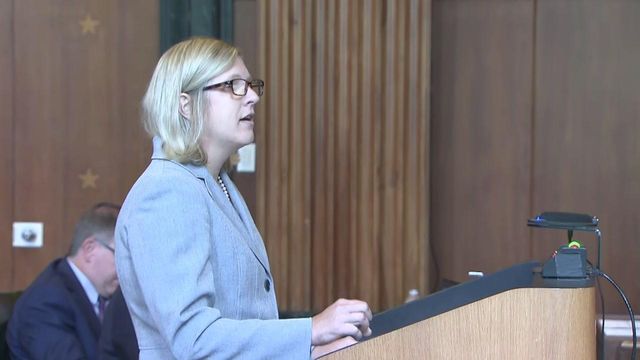UNC says NC Supreme Court should allow university to keep sexual assault records secret
A lawyer for the University of North Carolina at Chapel Hill told the state Supreme Court Tuesday that campus officials should have the authority to decide whether to release details about how it disciplined students implicated in sexual assault cases.
Posted — UpdatedThe case stems from a November 2016 lawsuit filed by a coalition of North Carolina media organizations – including the university's student newspaper, The Daily Tar Heel, and the parent companies of the Durham Herald Sun and WRAL News – who challenged the university's denial of a records request for the case information. University officials said the federal Family Educational Rights and Privacy Act, designed to protect student educational records, prevented disclosure.
Stephanie Brennan, a lawyer with the state attorney general's office representing UNC, told justices Tuesday that although provisions in FERPA give university officials the option of releasing the information, nothing in the law requires release. That discretion, she said, preempts North Carolina's open records law, which broadly permits access to records maintained by public agencies.
"They're not reconcilable here in the sense that we can just try to make them work together," Brennan said. "Here, the supremacy clause means that the federal statute has to prevail."
Brennan also raised the potential of a "chilling effect" on reports of sexual assault if the anonymous nature of the cases were revealed to the press.
"If victims don't access the system, there's no ability for the university to address sexual assault as they are required to do by Title IX," Brennan said.
In a subset of these cases, Brennan said, revealing the names of the accused could identify victims. That would violate both the federal student privacy law and prevent the university from combating sexual assault on campus.
"It's critically important that universities have the tools that Congress intended in order to be able to address this epidemic and deal with these situations," she said.
Media coalition attorney Hugh Stevens said he agreed campus sexual assault was an epidemic.
But he said the primary goal of The Daily Tar Heel and its then-editor Jane Wester in submitting the original records request was to reveal how the university was handling the issue.
"What Ms. Wester and her colleagues wanted to find out through these records – and to explain to their readers – was whether and to what extent the university had lived up to its commitment to them to ferret out sexual assault and punish it appropriately," Stevens said.
Stevens also didn't contest that FERPA grants the university discretion over whether to release the three requested pieces of case information, each of which the federal law specifies are not exempt from disclosure. But that discretion, he argued, is subsequently governed by North Carolina's open records law.
"The public records act is to be construed broadly, and exemptions and exceptions to it are to be construed narrowly," Stevens said. "That's exactly what the Court of Appeals did."
That argument prompted Associate Justice Samuel Ervin to reframe the question at hand.
"Does the university have an independent right under the statute to make a discretionary decision, or does the federal law allow the General Assembly to tell the university what its decision must be?" Ervin said. "That seems to me the guts of this case."
Stevens agreed.
"Obviously, the General Assembly has directed not only the university, but a wide array of public agencies under the public records law to be as transparent as possible," Stevens said. "The presumption is that records are public."
In response to questions from Associate Justice Anita Earls about the possibility of revealing victims, Stevens said media companies had never requested anything about victims and had no interest in publishing such information. Any arguments that releasing information about perpetrators would in turn reveal their victims, he said, was based on speculation.
"Ms. Brennan talks about privacy. What's the privacy interest in keeping secret the names of people who have committed heinous sexual offenses on campus?" he said. "Why is the university protecting sexual predators at all?"
Brennan challenged Stevens' argument in her rebuttal, saying concerns about the impact on sexual assault reporting reflected those of some victims' advocates who filed friend-of-the-court briefs on the university's behalf.
Despite the media's interest in the information, she said, publishing it would be damaging to more than just the victims.
"It doesn't improve the process to make this public," Brennan said.
A decision in the case isn't expect for months.
Related Topics
• Credits
Copyright 2024 by Capitol Broadcasting Company. All rights reserved. This material may not be published, broadcast, rewritten or redistributed.






